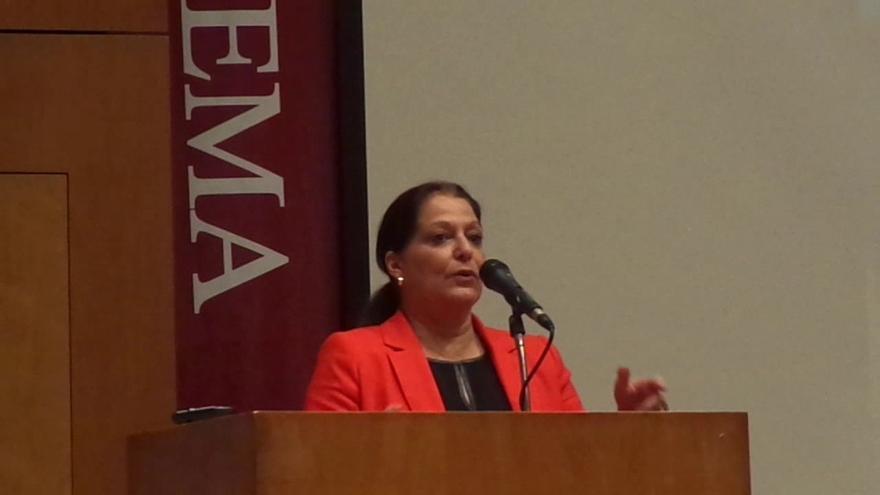
![]() EFE, via 14ymedio, Madrid, 9 April 2018 — “The children of the revolution stripped naked Cuban military authoritarian capitalism,” said Armando Chaguaceda, a professor at the University of Guanajuato (Mexico), on Monday, in his presentation of the book Human Rights: Realities and Challenges in Cuba.
EFE, via 14ymedio, Madrid, 9 April 2018 — “The children of the revolution stripped naked Cuban military authoritarian capitalism,” said Armando Chaguaceda, a professor at the University of Guanajuato (Mexico), on Monday, in his presentation of the book Human Rights: Realities and Challenges in Cuba.
Together with the editor of the volume, Marlene Azor, a professor at the Autonomous Metropolitan University of Mexico, Chaguaceda explained that the authors who contributed their articles “are born and live” on the island and their “academic inquiry intersects with activism.”
He emphasized, however, the academic rigor of the analysis of the situation of social, economic and cultural rights in Cuba from different perspectives.
According to his words, the authors “live in the so-called gray area, and are children of the revolution. This is not a research effort carried out from exile.”
At the event at the headquarters of the Atlantic Institute of Government, launched by José María Aznar in 2014, editor Marlene Azor denied the reality of the proclaimed achievements of the Castro revolution in the fields of health, education, access to water, culture and housing.
She criticized the Government of Cuba for ending the publication of poverty rates more than 20 years ago and recalled that, since the collapse of the Soviet Union and the end of its “subsidies,” things that had been considered social rights have ceased to be so.
“There is no social equality in the dictatorship,” she said, calling into question the existence of revolutionary successes and added that “there is no such success.”
Azor affirmed that there was a “national famine” in the early nineties and its existence has been denied by the Cuban government.
According to her data, the only improvements that the island’s economy has experienced since then is a slight increase in consumption and a reduction in power cuts, but she pointed out that “the level of precariousness is very important.”
She dismissed the official unemployment figure of 3.5% and reported that unemployment among the working age population of the Island reaches 28%, while incomes, she explained, are barely sufficient to cover anything other than food.
She also highlighted the absence of the right to freedom of association and collective bargaining in the country, and added that the country also lacks “freedom of employment.”
“All professionals are captives of state companies,” and do not even have the right to strike, said Azor, consistent with the fact that professionals are forbidden to practice independently, outside the state.
In her opinion, Cuba is “worse than any country with marginal capitalism” and cited as an example Haiti “where workers can strike.”
The housing deficit is another of the social deficiencies denounced by the book’s editor, who argued that at least 1.2 million homes are needed to meet the Island’s demand.
According to the data managed by Azor, only 5.7% of the population has running water 24 hours a day while for a large part of the population water is delivered via tanker trucks, which in common parlance are called “pipes.”
“It is a lie the size of the Eiffel Tower that no one is homeless in Cuba,” she said when referring to the state budget cuts, which she said have also affected social rights.
“Yes there are the rich and the very poor” in Cuba, said Azor.
Chaguaceda and Azor agreed in emphasizing the limitations of the expected political reforms which, they pointed out, could restart the initiatives begun with the support for cooperatives in 2011, which were paralyzed in 2017.
For Chaguaceda there will be “evolution, not transition” with the disappearance of the Castro brothers’ political scenario and he indicated that “everything points to (Miguel) Diaz-Canel,” the current vice president as the country’s next strongman.
__________________
The 14ymedio team is committed to serious journalism that reflects the reality of deep Cuba. Thank you for joining us on this long road. We invite you to continue supporting us, but this time by becoming a member of 14ymedio. Together we can continue to transform journalism in Cuba.
